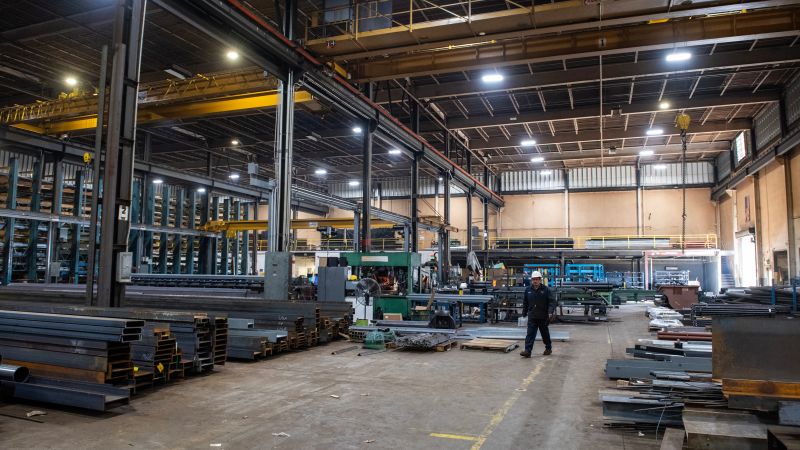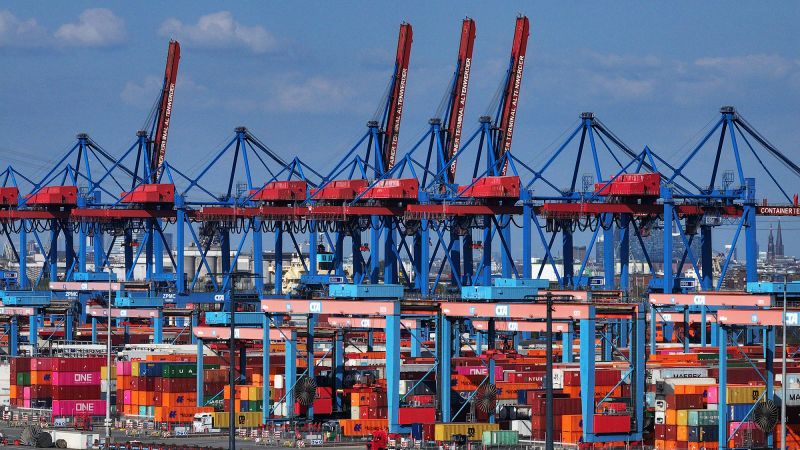The Global Trade War Continues

Introduction
The Trump administration has once again sparked a global trade war with its new sweeping tariff regime. This time, trading partners from Taiwan to Canada are feeling the impact of steep new levies.
Key Details
The United States has imposed tariffs on a wide range of goods, including steel and aluminum, from countries that it deems as "unfair trading partners." This move has been met with fierce opposition and retaliation from other countries, leading to a cycle of escalating tariffs and trade tensions.
The European Union, for example, has responded by imposing tariffs on iconic American products such as Harley-Davidson motorcycles and Levi's jeans. China, one of the US's biggest trading partners, has also retaliated with tariffs on American agricultural products and automobiles.
Impact
The consequences of this trade war are far-reaching, with industries and consumers feeling the effects. The price of goods has risen and companies are facing higher production costs, which may result in job cuts and economic instability. Small businesses, in particular, are struggling to cope with the added financial burden.
Furthermore, the trade war has also strained diplomatic relations between the US and its trading partners, potentially leading to long-term consequences for global trade and the economy.
With no end in sight, the global trade war continues to cause uncertainty and disruption in the market
About the Organizations Mentioned
European Union
The European Union (EU) is a unique economic and political partnership between 27 European countries, aiming to promote peace, stability, and economic cooperation. Established in 1993, the EU has evolved significantly since its inception, with key milestones including the introduction of the euro currency in 1999 and the expansion to include 27 member states. **History and Key Achievements:** - **Founding:** The EU's origins trace back to the European Coal and Steel Community (ECSC) in 1951, which evolved into the European Economic Community (EEC) in 1957. Over time, it expanded into the European Union with the Maastricht Treaty in 1992. - **Economic Integration:** The EU has fostered economic integration through the Single Market, allowing free movement of goods, services, and people among member states. - **Common Currency:** The euro, introduced in 1999, is used by 20 of the 27 member states, promoting economic stability and facilitating trade. **Current Status:** - **Challenges:** The EU faces ongoing challenges, including climate change, migration, and geopolitical tensions, particularly with Russia's aggression in Ukraine. - **Economic Outlook:** Euro area growth is forecast to remain weak in 2025, with GDP projected to expand by less than 1%[8]. - **Innovative Initiatives:** The EU is actively working on enhancing its technological and economic competitiveness, with initiatives like the Clean Industrial Deal and the Competitiveness Compass[4]. **Notable Aspects:** - **State of the Union Address:** The annual State of the Union address by the European Commission President outlines key priorities and initiatives for the year ahead, such as Ursula von der Leyen's 2025 address focusing on security, Ukraine support, and climate action[1][5]. - **Global Influence:** The EU is a significant player in global affairs, with initiatives like the Global Gateway aimed at sustainable development
Harley-Davidson
Harley-Davidson, Inc. is an iconic American motorcycle manufacturer renowned for its heavyweight motorcycles designed for cruising on highways. Founded in 1903 in Milwaukee, Wisconsin, by William S. Harley and the Davidson brothers—Arthur, Walter, and William—the company quickly grew into a symbol of American freedom and rugged individualism. Harley-Davidson’s distinctive V-twin engines and the signature rumbling sound have become synonymous with motorcycle culture worldwide. Throughout its history, Harley-Davidson has played a significant role in both military and civilian contexts. During World Wars I and II, the company supplied thousands of motorcycles to the U.S. military, boosting its reputation for durability and reliability. Post-war, Harley-Davidson capitalized on the growing leisure market, fostering a loyal community of riders and enthusiasts, often referred to as “HOGs” (Harley Owners Group). Key achievements include pioneering advances in motorcycle engineering and design, such as the introduction of the Evolution engine in 1984, which enhanced performance and reliability. The company also successfully navigated economic challenges, including near-bankruptcy in the early 1980s, by focusing on quality, brand identity, and lifestyle marketing. In recent years, Harley-Davidson has embraced technological innovation to stay relevant amid changing market dynamics. It has invested in electric motorcycles, notably the LiveWire, signaling a shift towards sustainable transportation. The company also leverages digital platforms to engage its global community and expand its brand presence. Currently, Harley-Davidson remains a leading player in the motorcycle industry, balancing its rich heritage with modern advancements. It continues to influence motorcycle culture and the broader automotive landscape, embodying a blend of tradition, innovation, and lifestyle appeal that captivates both longtime fans and new generations of riders.
Levi's
Levi's, formally Levi Strauss & Co., is a globally recognized apparel company best known for inventing the modern blue jean. Founded in 1853 by German immigrant Levi Strauss in San Francisco during the California Gold Rush, the company initially sold dry goods to miners. The breakthrough came in 1873 when Strauss partnered with tailor Jacob Davis, who patented riveted denim pants designed for durability, creating what became the prototype for today’s Levi's 501 jeans[1][2][4]. Levi's jeans evolved from practical workwear for miners and cowboys into a cultural icon embraced by various groups, including rebels, rock stars, and everyday consumers worldwide. The company trademarked its strength symbol with the Two Horse logo in 1886 and introduced innovations such as the Red Tab on jeans in 1936 and the first jeans for women in 1934[6]. The brand expanded internationally in the 1960s, opening offices and factories across Europe and Asia, helping cement its global presence. By the 1970s, Levi's was public and operating in 50 countries[1][6]. In 1986, Levi's launched Dockers, a line of casual yet business-appropriate khaki pants, which became a major commercial success during the casual dress code shift of the 1980s[3][6]. Despite challenges in the 2000s and declining sales, the company revitalized itself under CEO Chip Bergh from 2011 by focusing on innovation, expanding women's apparel, and launching the Eureka Innovation Lab in San Francisco[3]. Today, Levi Strauss & Co. operates about 500 stores worldwide and sells products in over 100 countries. Besides Levi’s jeans, the company owns brands like Dockers, Signature by Levi Strauss & Co., Denizen, and Beyond Yoga, showcasing a commitment to both heritage and innovation in apparel. Levi's remains a symbol of durable, authentic self-expression, blending its rich history with modern business and technologica













